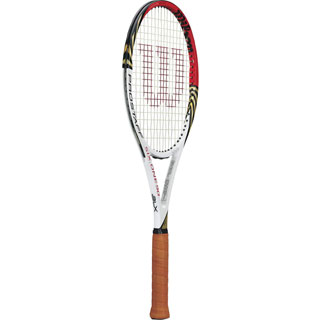What makes a tennis racquet a tennis racquet?
April 27th, 2012
There is a reason you can’t play competitively with a racquetball or squash racquet, so I’m going to tell you the features of the racquet that make it specifically for tennis.
First off, is the length; all tennis racquets are 27 inches long, with the few exceptions being plus size racquets, which can reach up to 27.5 inches. The main components of that length are the head, which is where the strings sit and usually that take up about half the length of the racquet. Then there’s the handle, which is the bottom of the racquet up until the grip material ends. And the length in between the handle and the head is the throat, which resembles an upside down triangle.
A couple other components of a tennis racquet are the bumper/grommets, which are the plastic pieces that cover the outside of the racquet head in order to protect the frame, and to give holes to put the string through when stringing a racquet. There is also the butt cap, which sits at the very bottom of the racquet, directly under where the grip ends.
The two most important aspects of a tennis racquet when considering one for purchase is the head size and weight.
The head size will generally range from 90 square inches (ex: Wilson Six One 90 BLX) to 135 square inches (ex: Weed Zone OS). Anything between 90-95 sq in is considered a mid, which caters to advanced players who can generate a lot of power on their own, then 96-103 is considered Midplus, which caters to players who can still generate power and make solid contact most of the time. Then there are oversizes, which range from 104-135 sq in, which are good for players that need a little more power as well as a larger sweet spot to make contact with more frequently. Equally as important is the weight of the racquet, which can range from about 8.5 ounces to about 12.6 ounces. Normally, the racquets with a larger head size and a wider body tend to be lighter, and the smaller head sizes with a thin beam tend to be the heaviest racquets.
So for example, the least powerful racquet would be the Wilson Six One 90 BLX, which has a headsize of only 90 sq in and a heavy weight of 12.6 ounces. On the other side of the spectrum, a racquet like the Prince Exo3 Silver has a headsize of 115 sq in and a weight of 9 ounces, offering a very powerful frame for those looking for an easy racquet to swing with a large sweet spot (the sweet spot is the area of the strings where the ball makes solid contact to make a solid shot).
Most players are looking for something in between, and tend to fall into a tennis racquet like the Babolat Pure Drive, which has a headsize of 100 sq in and a weight of 10.6 ounces. It provides an excellent medium for power and control, and caters to many players as a result of it. So when researching tennis racquets, be sure to look at the headsize and weight to find the right racquet for you.
The one last very important thing to pay attention to is the grip size; it ranges from 4 to 4 5/8, corresponding to the circumference of the grip in inches. The average grip size is 4 3/8, but be sure to play with a size that is comfortable on your hand while giving you the best feeling on your shots. The size increments run at 1/8 of an inch, but that small amount adds up when you aren’t playing with the correct grip size.
There are other things like balance, or string pattern to think about when buying a racquet, but what’s most important is to find the correct head size and weight, with the correct grip size and you should be good to go.
If you enjoyed this article, here are some others you may enjoy..



